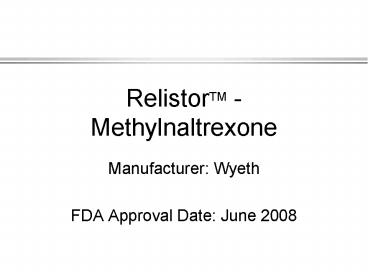RelistorTM Methylnaltrexone - PowerPoint PPT Presentation
1 / 16
Title:
RelistorTM Methylnaltrexone
Description:
Clinical Application ... Objective: Study the safety and efficacy of methylnaltrexone for ... The percentage of patients having at least one adverse event was ... – PowerPoint PPT presentation
Number of Views:338
Avg rating:3.0/5.0
Title: RelistorTM Methylnaltrexone
1
RelistorTM - Methylnaltrexone
- Manufacturer Wyeth
- FDA Approval Date June 2008
2
Relistor - Methylnaltrexone Clinical Application
- Indications
- Opioid induced constipation in patients with
advanced illnesses having an inadequate response
to traditional laxatives - Place in therapy
- Patients with advanced illnesses receiving
palliative care experiencing an inadequate
response to conventional laxative therapies
3
Relistor - Methylnaltrexone Clinical Application
- Contraindications
- Mechanical bowel obstruction
- Warnings (and Black Box warnings)
- Stop methylnaltrexone if opioids are discontinued
- May cause dizziness
- Concomitant use with SSRIs, lithium,
carbamazepine, or valproic acid may produce
additive effects - Precautions
- Use caution in patients with severe renal failure
(lt30 ml/min use 50 of dose)
4
Relistor - MethylnaltrexoneDrug Facts
- Pharmacology
- Antagonizes mu opioid receptors peripherally
(unable to cross BBB), inhibits opioid induced
decreased gastrointestinal motility and delay in
gastrointestinal transit time
5
Relistor - MethylnaltrexoneDrug Facts
- Pharmacokinetics
- A Rapid Cmax 0.5 hours
- D 1.1 L/Kg
- M Metabolized to methyl-6-naltrexol isomers,
methylnaltrexone sulfate - E Urine (50, primarily as unchanged drug),
Feces (lt50, primarily as unchanged drug)
6
Relistor - Methylnaltrexone Drug Interactions
- Methylnaltrexone is a weak inhibitor of CYP2D6
- No known drug interactions
7
Relistor - Methylnaltrexone Adverse Effects
8
RelistorTM - Methylnaltrexone Monitoring
Parameters
- Efficacy Monitoring
- Relief of constipation
- Toxicity Monitoring
- Discontinue if severe or persistent diarrhea
occurs
9
Relistor - Methylnaltrexone Prescription
Information
- Dosing
- Usually given as one dose every other day, as
needed (Subcutaneous injection) - lt38 kg 0.15 mg/kg (round up to nearest 0.1 ml of
volume) - 38 - lt62 kg 8 mg
- 62 114 kg 12 mg
- gt144 kg 0.15 mg/kg
- Max 1 dose / 24 hours
- Cost
- 12 mg vial 50
10
Methylnaltrexone in Opioid-Induced Constipation
- Objective Study the safety and efficacy of
methylnaltrexone for treatment of opioid-induced
constipation in patients with advanced illness - Study Design Double-blind placebo controlled
trial
Thomas, J. et al. Methylnaltrexone for
Opioid-Induced Constipation in Advanced
Illness.NEJM. 20083582332-43
11
Methylnaltrexone in Opioid-Induced Constipation
- Methods Patients were randomized to receive
methylnaltrexone (0.15 mg/kg) or placebo every
other day for 2 weeks - Primary endpoints - rescue free laxation within 4
hours after the first dose and laxation after 2
or more hours of the first four doses
Thomas, J. et al. Methylnaltrexone for
Opioid-Induced Constipation in Advanced
Illness.NEJM. 20083582332-43
12
Methylnaltrexone in Opioid-Induced Constipation
Thomas, J. et al. Methylnaltrexone for
Opioid-Induced Constipation in Advanced
Illness.NEJM. 20083582332-43
13
Methylnaltrexone in Opioid-Induced Constipation
Thomas, J. et al. Methylnaltrexone for
Opioid-Induced Constipation in Advanced
Illness.NEJM. 20083582332-43
14
Methylnaltrexone in Opioid-Induced Constipation
- Adverse Events
- The percentage of patients having at least one
adverse event was similar between both groups - Events occurring gt5 or more in both groups,
abdominal pain, flatulence, nausea, increased
body temperature, and dizziness occurred 3 more
in the methylnaltrexone group than placebo
Thomas, J. et al. Methylnaltrexone for
Opioid-Induced Constipation in Advanced
Illness.NEJM. 20083582332-43
15
RelistorTM - Methylnaltrexone Summary
- Methylnaltrexone is an alternative treatment
option in opioid-induced constipation in patients
with advanced illness - It does not cross the BBB allowing patients to
have relief of constipation while still receiving
beneficial pain relief from opioids - It is an effective, and relatively safe and well
tolerated medication
16
Relistor - Methylnaltrexone References
- http//www.wyeth.com/hcp/relistor/mechanism-of-act
ion. Accessed Online 02/18/2009. - Relistor package insert. Philadelphia, PA
Wyeth April 2008 - Thomas, J. et al. Methylnaltrexone for
Opioid-Induced Constipation in Advanced
Illness.NEJM. 20083582332-43.































